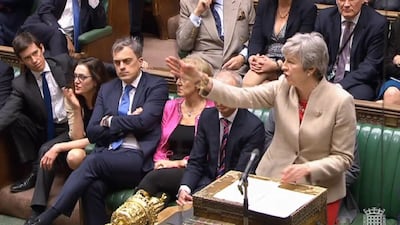Britain’s parliament on Friday rejected premier Theresa May’s plan to leave the European Union for a third time despite her warning that it could “destroy Brexit”.
After a highly-charged debate, MPs voted by 344 to 286 against Mrs May’s plan that she hoped would ensure that Britain leaves the bloc on May 22.
The vote came on the day that the UK had originally been planning to leave the European Union but divisions within the country and her own party forced Mrs May to delay the planned departure date.
The defeat throws the UK's Brexit plans into further confusion with no obvious way to break the deadlock in parliament.
Thousands of pro-Brexit supporters gathered outside parliament and accused MPs of betrayal for failing to accept the result of a 2016 referendum when Britons voted by 52 per cent to 48 to leave the bloc.
The defeat means that the UK has until April 12 to ask the remaining 27 members for a further extension to Brexit negotiations. That would require Britain to take part in elections in May to the European parliament or leave the EU without a deal.
Donald Tusk, the president of the European Council, announced after the vote that he would call a meeting of the heads of state for April 10.
After the defeat, Mrs May said: "I think it should be a matter of profound regret to every member of this House that once again we have been unable to support leaving the European Union in an orderly fashion.
"The implications of the House’s decision are grave."
She added: "This Government will continue to press the case for the orderly Brexit that the result of the referendum demands."
The way forward was unclear last night with a deadlocked parliament due to resume discussions on Monday to find a way forward that could command a majority.
Downing Street also signalled that Mrs May would continue to try to push her own deal despite a third defeat.
The defeat by 58 votes was significantly smaller than previous losses after rebellious colleagues backed her deal because they feared that Brexit might not happen at all if Mrs May’s plans were thrown out for a third time. Her plan had previously been beaten by 230 and 149 votes.
Before the vote, Mrs May said that supporting her deal would avoid "a long extension which would at least delay and could destroy Brexit".
The Scottish Nationalist party said that the government should finally revoke plans to leave the European Union and hold national elections.
"We need to apply the handbrake to this process," said Ian Blackford, the party's leader in Westminster.
Some of the MPs who had opposed her plans were swayed after Mrs May said earlier this week that she would quit as prime minister if her deal, agreed with the European Union in November last year, got through parliament.
They included two former Cabinet ministers who quit in protest at her plans but returned to the fold in the hours before the vote.
Former Brexit minister, Dominic Raab, and ex-Foreign Secretary Boris Johnson, had previously spoken out vociferously against her plans.
Mrs May's plan was scuppered by the opposition of a small Irish party, which props up her minority government. Some pro-Brexit MPs from the ruling party have consistently said that they would follow the lead of the Democratic Unionists.
The European Union has repeatedly said it will not renegotiate the agreement that it struck with the British government in November.
“The European Council reiterates that there can be no opening of the withdrawal agreement that was agreed between the Union and the United Kingdom in November 2018," the council said.

